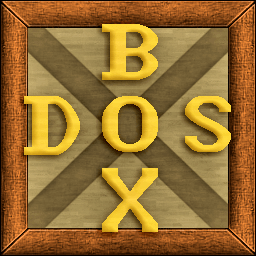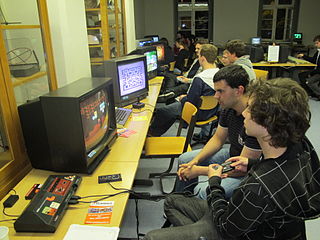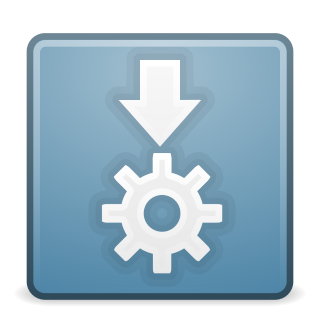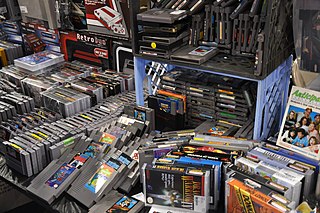
MAME is a free and open-source emulator designed to recreate the hardware of arcade game systems in software on modern personal computers and other platforms. Its intention is to preserve gaming history by preventing vintage games from being lost or forgotten. It does this by emulating the inner workings of the emulated arcade machines; the ability to actually play the games is considered "a nice side effect". Joystiq has listed MAME as an application that every Windows and Mac gamer should have.
bnetd is a communication app that enables users of the online game StarCraft released on March 31, 1998 to connect and chat together. Bnetd was released on April 28, 1998 under the name StarHack and provided near-complete emulation of the original online multiplayer gaming service network. This was accomplished through reverse engineering of the corporate Blizzard Entertainment's Battle.net.
UltraHLE is a discontinued emulator for the Nintendo 64. Emulating the Nintendo 64 made it the first of the N64 emulators to run commercial titles at a playable frame rate on the hardware of the time, and the first emulator for a currently-sold console system, which drew Nintendo to seek legal action against the developers.

Retrocomputing is the current use of older computer hardware and software. Retrocomputing is usually classed as a hobby and recreation rather than a practical application of technology; enthusiasts often collect rare and valuable hardware and software for sentimental reasons.

A ROM image, or ROM file, is a computer file which contains a copy of the data from a read-only memory chip, often from a video game cartridge, or used to contain a computer's firmware, or from an arcade game's main board. The term is frequently used in the context of emulation, whereby older games or firmware are copied to ROM files on modern computers and can, using a piece of software known as an emulator, be run on a different device than which they were designed for. ROM burners are used to copy ROM images to hardware, such as ROM cartridges, or ROM chips, for debugging and QA testing.
Multi Emulator Super System (MESS) is an emulator for various consoles and computer systems, based on the MAME core. It used to be a standalone program, but is now integrated into MAME. MESS emulates portable and console gaming systems, computer platforms, and calculators. The project strives for accuracy and portability and therefore is not always the fastest emulator for any one particular system. Its accuracy makes it also useful for homebrew game development.

Digital obsolescence is the risk of data loss because of inabilities to access digital assets, due to the hardware or software required for information retrieval being repeatedly replaced by newer devices and systems, resulting in increasingly incompatible formats. While the threat of an eventual "digital dark age" was initially met with little concern until the 1990s, modern digital preservation efforts in the information and archival fields have implemented protocols and strategies such as data migration and technical audits, while the salvage and emulation of antiquated hardware and software address digital obsolescence to limit the potential damage to long-term information access.

DOSBox is a free and open-source emulator which runs software for MS-DOS compatible disk operating systems—primarily video games. It was first released in 2002, when DOS technology was becoming obsolete. Its adoption for running DOS games is widespread, with it being used in commercial re-releases of those games as well.
In library and archival science, digital preservation is a formal endeavor to ensure that digital information of continuing value remains accessible and usable. It involves planning, resource allocation, and application of preservation methods and technologies, and it combines policies, strategies and actions to ensure access to reformatted and "born-digital" content, regardless of the challenges of media failure and technological change. The goal of digital preservation is the accurate rendering of authenticated content over time. The Association for Library Collections and Technical Services Preservation and Reformatting Section of the American Library Association, defined digital preservation as combination of "policies, strategies and actions that ensure access to digital content over time." According to the Harrod's Librarian Glossary, digital preservation is the method of keeping digital material alive so that they remain usable as technological advances render original hardware and software specification obsolete.

Retrogaming, also known as classic gaming and old school gaming, is the playing and collection of obsolete personal computers, consoles, and video games. Usually, retrogaming is based upon systems that are outmoded or discontinued, although ported retrogaming allows games to be played on modern hardware via ports or compilations. It is typically for nostalgia, preservation, or authenticity. A new game could be retro styled, such as an RPG with turn-based combat and pixel art in isometric camera perspective.

AppImage is a format for distributing portable software on Linux without needing superuser permissions to install the application. It aims to enable application developers to deploy binary software without being restricted to specific Linux distributions, a concept often referred to as upstream packaging. In this manner, a single developed software can effortlessly run on any Linux distribution, such as Ubuntu, RHEL, or Arch.
Abandonia is an abandonware website, focusing mainly on showcasing video games and distributing games made for the MS-DOS system.
The conservation and restoration of new media art is the study and practice of techniques for sustaining new media art created using from materials such as digital, biological, performative, and other variable media.

Higan is a free and open source emulator for multiple video game consoles, including the Super Nintendo Entertainment System. Originally called bsnes, the emulator is notable for attempting to emulate the original hardware as accurately as possible through low-level, cycle-accurate emulation and for the associated historical preservation efforts of the Super NES platform.
In computing, virtualization or virtualisation is the act of creating a virtual version of something at the same abstraction level, including virtual computer hardware platforms, storage devices, and computer network resources.
Abandonware is a product, typically software, ignored by its owner and manufacturer, and for which no official support is available.

A video game console emulator is a type of emulator that allows a computing device to emulate a video game console's hardware and play its games on the emulating platform. More often than not, emulators carry additional features that surpass limitations of the original hardware, such as broader controller compatibility, timescale control, easier access to memory modifications, and unlocking of gameplay features. Emulators are also a useful tool in the development process of homebrew demos and the creation of new games for older, discontinued, or rare consoles.

In computing, an emulator is hardware or software that enables one computer system to behave like another computer system. An emulator typically enables the host system to run software or use peripheral devices designed for the guest system. Emulation refers to the ability of a computer program in an electronic device to emulate another program or device.
Game engine recreation is a type of video game engine remastering process whereby a new game engine is rewritten from scratch as a clone of the original with the ability to load the original game's data files such as music, textures, scripts, shaders, levels, and more. The new engine should read these data files and, in theory, load and understand them in a way that is indistinguishable from the original. The result of a proper engine clone is often the ability to play a game on modern systems that the old game could no longer run on. It also opens the possibility of community collaboration, as many engine remake projects tend to be open source. Game engine recreation can be beneficial to game publishers because the legal use of a re-creation still requires the original data files, as a player must still purchase the original game in order to legally play the re-created game.

Video game preservation is a form of preservation applied to the video game industry that includes, but is not limited to, digital preservation. Such preservation efforts include archiving development source code and art assets, digital copies of video games, emulation of video game hardware, maintenance and preservation of specialized video game hardware such as arcade games and video game consoles, and digitization of print video game magazines and books prior to the Digital Revolution.










